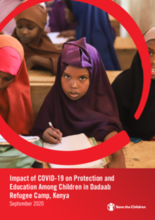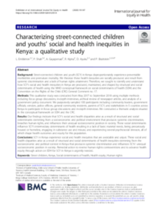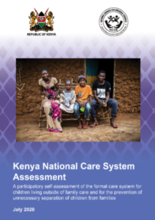This country page features an interactive, icon-based data dashboard providing a national-level overview of the status of children’s care and care reform efforts (a “Country Care Snapshot”), along with a list of resources and organizations in the country.
demographic_data
childrens_living_arrangement
children_living_without_bio
adoption
social_work_force
key_stakeholders
Key Stakeholders
Add New DataOther Relevant Reforms
Add New Datadrivers_of_institutionalisation
Drivers of Institutionaliziation
Add New Datakey_research_and_information
Key Data Sources
Add New DataChildren's Act, 2022 (Kenya)
Prevalence and number of children living in institutional care: global, regional, and country estimates
Social Protection and Disability in Kenya
Kenya Social Protection Sector Review
Country Care Review: Kenya
Child Developmental Disabilities, Caregivers’ Role in Kenya and Its Implications on Global Migration
Research findings on Alternative care system in Kenya for children without parental care
Charitable Children Institutions in Kenya: Factors Influencing Institutionalization of Children
Acknowledgements
Data for this country care snapshot was contributed by consultants with Maestral International.
Displaying 201 - 210 of 447
Save the Children conducted research in three refugee camps in Dadaab in Kenya which explored the impact of COVID-19 on children’s education, young mothers’ livelihoods and gender-based violence. This study highlights programmatic adaptations made in response to COVID-19, identifying what has worked well or less well and considers practical recommendations for the sector.
This study sought to identify and understand how street-connected children and youth (SCY)’s social and health inequities in Kenya are produced, maintained, and shaped by structural and social determinants of health using the WHO conceptual framework on social determinants of health (SDH) and the Convention on the Rights of the Child (CRC) General Comment no. 17.
This case report depicts the quest for health insurance coverage of two HIV orphans with Burkitt lymphoma in Kenya.
During the induction of Adoption Committee Members at Machakos University on Monday, August 17, 2020, the Kenyan Cabinet Secretary of Labour and Social Protection, Simon Chelugui, made remarks underscoring "the importance of the basic family unit in the nurturing, care and raising of children in society," according to this article from the Sun Weekly.
This launch webinar provided an introduction to the Transitioning Models of Care Assessment Tool, an assessment framework that assists practitioners to identify and analyze key starting point dynamics and determine the implications for strategy in supporting organisations to transition from an institutional to non-institutional model of care.
This care system assessment is intended to support the Government of Kenya to assess and strengthen the national, formal care system.
"Two rights groups want child welfare to receive priority [in Kenya] during the Covid-19 pandemic," says this article from the Daily Nation.
"An American Christian missionary has pleaded guilty in a US court to sexually abusing young girls at the orphanage he started in Kenya," says this article from BBC News.
FICE Israel decided to initiate a short survey to document and share information about the way different countries handled their policies and practices in residential care facilities during that period. This report presents findings and some conclusions from this primary survey.
The vision of the National Prevention and Response Plan is to foster a society where all children live free of all forms of violence. Its goal is for all children in Kenya to be protected from physical, sexual and emotional violence, and for those children who experience violence to have access to care, support and services. It aims to reduce the prevalence of childhood violence – that is, a child experiencing at least one form of physical, emotional and sexual violence – by 40 per cent by 2024.





